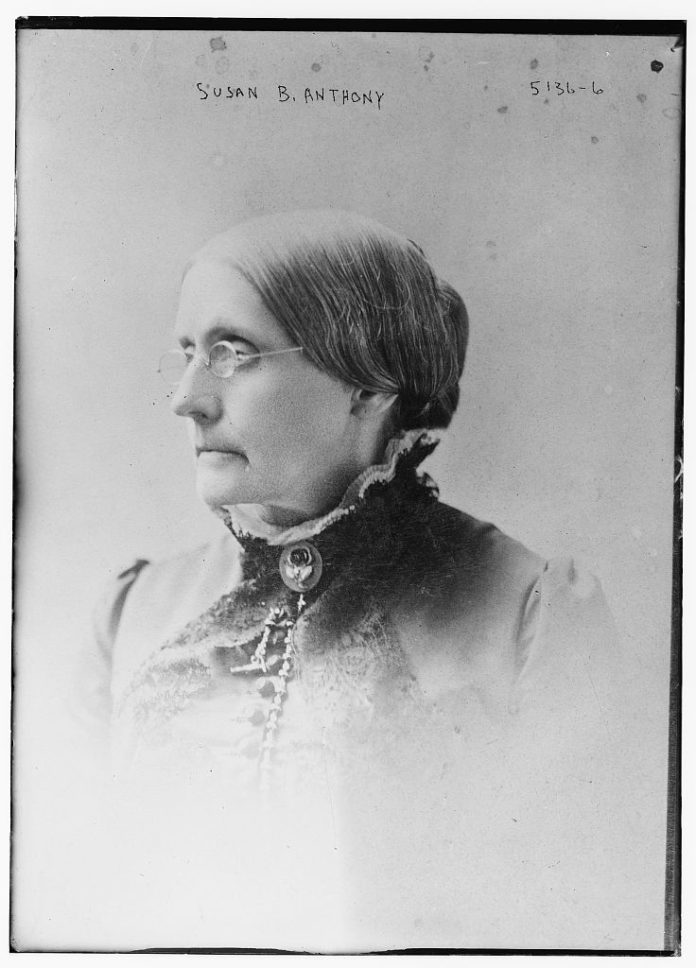By Emily Cousins | Staff Writer
Women’s Equality Day (Aug. 26) faces controversy as protectors of Susan B. Anthony’s legacy said President Donald Trump’s pardon takes away from Anthony’s stance against injustice.
Anthony believed women should have the right to vote. She was arrested in 1872 for voting, which allowed the women’s suffrage movement to gain national attention.
At her trial, Anthony was not allowed to speak because she was a woman. The judge overseeing her trial did not allow her to have a trial by jury, pronounced her guilty and fined her $100. She refused to pay it.
To commemorate the 100th anniversary of the 19th Amendment, Trump decided to pardon Anthony, but National Susan B. Anthony Museum & House president and CEO Deborah L. Hughes released a statement rejecting the pardon.
“Objection! Mr. President, Susan B. Anthony must decline your offer of a pardon today,” Hughes said in the statement.
“When pardoning someone, that’s an acknowledgment they committed a crime,” associate professor of history Dr. Andrea L. Turpin said.
“While Susan B. Anthony legally committed a crime by voting when it was forbidden for women to vote in that state, she did it to protest that the law is immoral. So a pardon could be misunderstood as saying she committed an actual moral crime in addition to a legal crime,” Turpin said.
Turpin said Trump should have consulted those who have studied and protected Anthony’s legacy before making the decision.
“If he had consulted them, then he would’ve had more context for a way to honor the women who fought for women’s right to vote. It’s partly a failure of, perhaps just listening to women, perhaps the women who are caretakers of her legacy but also simply as of acknowledging the importance of history and learning from people who are caretakers in the past when you’re going to something in the present about the significance of the past,” Turpin said.
Trump’s intention may have been a genuine effort to commemorate the 19th Amendment, but Alice Shelly, San Antonio sophomore and vice president pro tempore of Baylor Democrats, said she doesn’t believe his motives were pure.
“President Trump pardoned Susan B. Anthony as a political symbol to try and get the vote of moderate feminists. Pardoning Susan B. Anthony does not outweigh President Trump’s track record of misogynistic comments and lack of action for reproductive justice. If you would like to know President Trump’s stance on women, there are plenty of taped recordings of him stating his beliefs,” Shelly said.
Dr. Rebecca McCumbers Flavin, senior lecturer of political science, said a better way to celebrate would have been to expand voting rights and make sure everyone had an equal chance to vote in November.
“Voting rights, which are incredibly important, increasingly, from areas of the country, are under attack, and this isn’t something new in our country’s history,” Flavin said. “We have a legacy of voter suppression and that’s why the Voting Rights Act of 1965 was enacted.”
Even though this is the 100th anniversary of women’s suffrage, Flavin said not to overlook that women of color couldn’t vote until the Voting Rights Act of 1965, and some even had to wait until the Voting Rights Act was expanded in 1975.
Veronica Penales, Shreveport, La., sophomore and President Pro Tempore of Baylor Democrats, said the 100th anniversary of the 19th Amendment is a reminder of the work to be done.
“There is always a little asterisk that can be placed in such a statement because not all women were granted the right to vote one hundred years ago. African American women were granted this same right almost half a century later with the passage of the Voting Rights Act. While this amendment was a monumental advancement for the feminist movement, the disenfranchisement of BIPOC continued, and I think this is a fact that many people overlook today,” said Penales.






